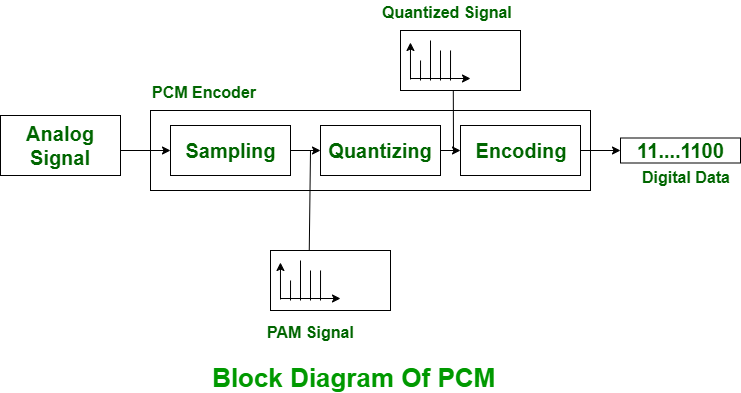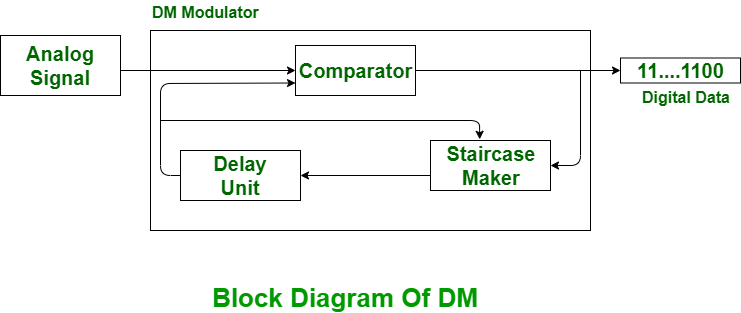Difference between Pulse Code Modulation (PCM) and Delta Modulation (DM)
Last Updated :
31 Aug, 2023
PCM stands for Pulse Code Modulation and DM stands for Delta Modulation. PCM is basically used for reworking analog to digital signals and DM is a conversion technique between analog and digital signals. In this article, we will discuss these two topics and also see the differences between these PCM and DM.
Pulse Code Modulation (PCM)
Pulse Code Modulation is the technique used for reworking analogue signals into digital signals. PCM has a good or sensible signal-to-noise ratio. For transmission, Pulse Code Modulation wants high transmitter bandwidth. PCM technique is split into three elements, initial is the transmission at the provision end, second regeneration at the transmission path and conjointly the receiving end.

Pulse Code Modulation (PCM)
Delta Modulation(DM)
Delta modulation is an analog to digital and digital to analog signal conversion technique. Delta modulation is employed to realize high signal to noise ratio. It uses one bit PCM code to realize digital transmission of analog signal. With delta modulation, instead of transmit a coded illustration of a sample solely one bit is transmitted, that merely indicates whether or not the sample is larger or smaller than the previous sample. it’s the best type or simplest type of Differential Pulse Code Modulation. Delta modulation signal is smaller than Pulse Code Modulation system. If signal is large, the next bit in digital data is 1 otherwise 0.

Delta Modulation (DM)
Difference Between Pulse Code Modulation (PCM) and Delta Modulation (DM)
| PCM stands for Pulse Code Modulation. |
DM stands for Delta Modulation. |
| In PCM, feedback does not exist in transmitter or receiver. |
While in DM, feedback exists in transmitter. |
| Per sample 4, 8, or 16 bits are used. |
Here, only one bit is used per sample. |
| PCM requires highest transmitter bandwidth. |
DM requires lowest transmitter bandwidth. |
| PCM is complex in terms of complexity of implementation. |
While DM is simple in terms of complexity of implementation. |
| PCM has good signal to noise ratio. |
While DM has poor signal to noise ratio. |
| PCM is costly. |
DM is cheap. |
| PCM may be a technique wont to digitally represent sampled analog signals. |
Digital to analog and analog to digital converter. |
| In PCM, signal requires encoder and decoder both sides. |
In DM, signal can modulate and demodulate. |
| PM is mostly used in video telephony and audio telephony. |
DM is mostly used in speeches as well as images. |
Frequently Asked Questions
Q. 1: Among PCM and DM, which is more efficient to bandwidth?
Answer:
Delta Modulation (DM) is more bandwidth efficient because of its transmission of difference between samples.
Q. 2: How does PCM handles the accuracy of signals?
Answer:
PCM helps in providing high signal accuracy by changing the analog signals to different discrete levels.
Q. 3: How signal reconstruction is handled in PCM and DM?
Answer:
Signal are handled in PCM and DM as follows:
- PCM reconstructs the signal using Quantized values.
- DM uses Comulative step sizes for the reconstruction purpose.
Like Article
Suggest improvement
Share your thoughts in the comments
Please Login to comment...